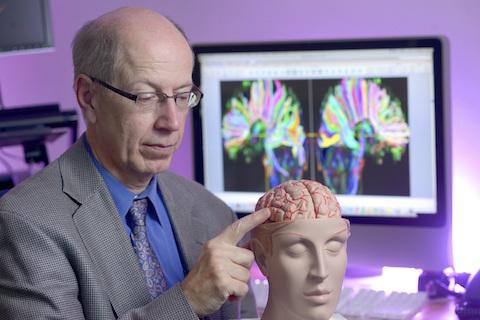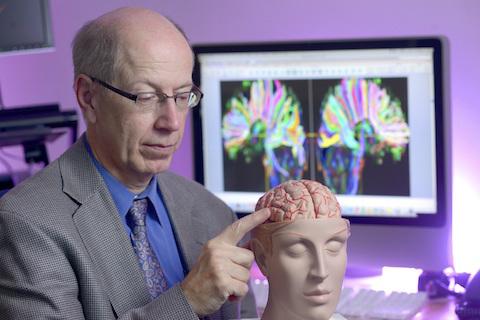
Credit: UT Southwestern
DALLAS – December 12, 2016 – The nation's largest statewide effort to track concussions among youth athletes is under way in Texas with the launch of a registry designed to assess the prevalence of brain injuries in high school sports.
The ConTex registry – a partnership between the University Interscholastic League (UIL) and the UT Southwestern Peter O'Donnell Jr. Brain Institute – will fill a major gap in concussion research and is expected to provide a gauge for whether certain rules or equipment changes are improving player safety.
The registry may also provide a blueprint for other states considering similar efforts and could be a key step in creating a nationwide database for concussions. Such a project was recently proposed by the U.S. Centers for Disease Control and Prevention.
"This is a groundbreaking initial step. I think we're on the verge of a very impactful project that will inform the nation about the frequency of concussions and will provide basic information about concussion and recovery in student-athletes," said Dr. Munro Cullum, Professor of Psychiatry, Neurology and Neurotherapeutics and Neurological Surgery with the O'Donnell Brain Institute at UT Southwestern Medical Center.
The UIL, which regulates athletics in Texas public schools, has partnered with the O'Donnell Brain Institute to implement the registry, which will complement studies in other age groups. While the NCAA, NHL, NFL and other professional sports organizations are tracking the issue in the college and professional ranks, little has been done on a scale as large as Texas to evaluate concussions in youth athletics.
The registry in Texas – which leads the U.S. with more than 800,000 students participating in high school sports – will include player concussion cases reported by middle and high school athletic trainers in all UIL-sanctioned athletic activities.
"The health and safety of our student participants is at the forefront of everything we do," said Charles Breithaupt, UIL Executive Director. "The UIL Medical Advisory Committee has been focused on concussions since its inception 15 years ago and this concussion registry will provide valuable information and help us continue to improve the safety of extracurricular athletics."
The ConTex project is modeled after a smaller concussion study (ConTex1) that Dr. Cullum helped launch last year that tracks more detailed information about concussions in the Dallas-Fort Worth area. He also led a first-of-its-kind study published last year that found NFL players who lost consciousness due to concussion showed key differences in brain structure later in life.
The statewide registry relies on athletic trainers and school personnel across Texas to report all concussions that occur in UIL athletics to a central database through an app or online site developed by Medical Innovation Labs in Austin. Among the information being tracked is the cause of the injury, concussion history, the gender of the player and other data. During this school year, UIL-member schools will participate on a voluntary basis, with plans to expand reporting next school year.
Dr. Cullum, the principal investigator of both ConTex studies, said his team will measure how often concussions occur in each sport, identify areas with low rates, and with more data eventually examine whether certain practices are helping reduce concussions or shorten recovery times in those areas.
Children under age 15 account for the most traumatic brain injury visits to the emergency room, according to CDC findings released in July from a national survey of hospital records. Because there is no system in place to fully assess the prevalence of concussions in youth athletics, the CDC is seeking federal funding to establish a national database.
"A lot of states will follow suit if they're not already working on this very topic," said Dr. Cullum, a neuropsychologist who holds the Pam Blumenthal Distinguished Professorship in Clinical Psychology. "I do think our registry will develop a very strong groundwork for a national registry."
All 50 states have passed legislation in recent years to address concussions in extracurricular athletics, but few have successfully launched statewide registries to track such injuries in all sports. Hawaii, for instance, launched its own registry in 2010, but the data have been relatively limited, with only 67 high schools participating. Colorado, Arizona and Maine have more recently launched their own. The UIL will be the first association of its kind to launch a registry of this magnitude.
Researchers expect the broader statistics gathered in Texas will give substantial insight into the prevalence of concussions in student-athletes and quickly benefit other clinical and research efforts at the O'Donnell Brain Institute. This benefit will include an array of neurological studies involving current and former NFL players, education outreach in schools, and a new sports concussion return-to-play clinic that promotes medically monitored exercise during recovery.
###
The statewide registry is funded through UT Southwestern's Texas Institute for Brain Injury and Repair, which was established with $7.5 million in annual funding from the Texas Legislature to explore the full spectrum of brain injuries from strokes to spinal cord injuries.
Questions about the registry can be emailed to [email protected]
Concussion Extras
- QA: Impact of Texas registry
- Blog: Athletes who sandbag on concussion tests
- Video: UTSW, Cowboys on concussion outreach
- Contact: [email protected]
About UT Southwestern Medical Center
UT Southwestern, one of the premier academic medical centers in the nation, integrates pioneering biomedical research with exceptional clinical care and education. The institution's faculty includes many distinguished members, including six who have been awarded Nobel Prizes since 1985. The faculty of almost 2,800 is responsible for groundbreaking medical advances and is committed to translating science-driven research quickly to new clinical treatments. UT Southwestern physicians provide medical care in about 80 specialties to more than 100,000 hospitalized patients and oversee approximately 2.2 million outpatient visits a year.
Media Contact
James Beltran
[email protected]
214-648-3404
@UTSWNews
http://www.swmed.edu





